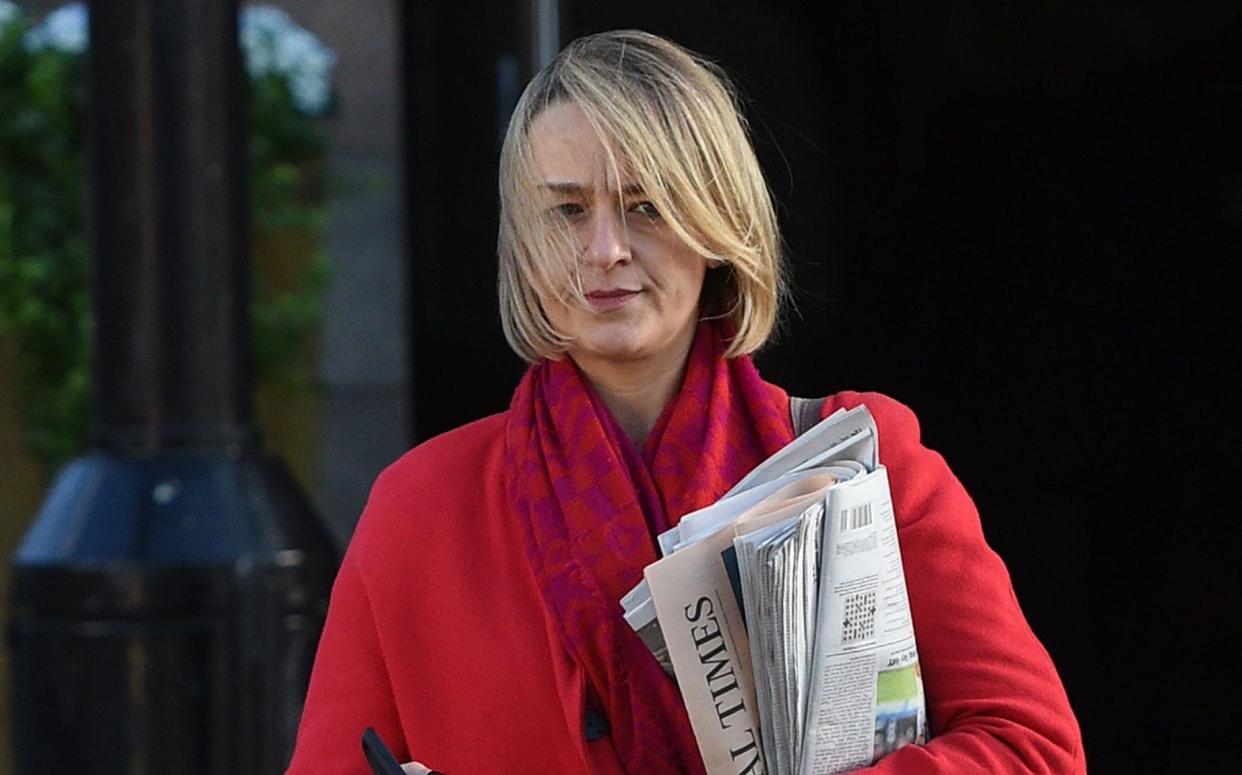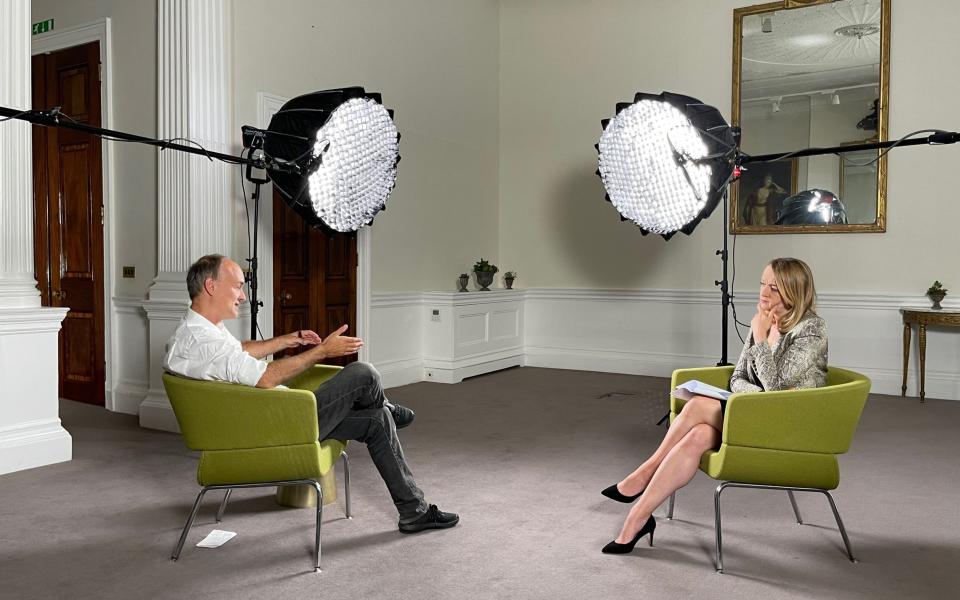What next for Laura Kuenssberg - one of the most vilified women on TV

Laura Kuenssberg, the first woman to be BBC Political Editor, has apparently had enough. The BBC is awash with talk that the tough-talking blonde wants out of her controversial gig and fancies a (relatively) relaxed life as a presenter on the Today programme. It is a measure of how hectic her job must have been over the past six years that Today – with its 3am starts – is said to appeal as a more restful sinecure.
But it must surely be due, in part, to the high profile her current role has brought.
The 45-year-old is a Marmite figure: seemingly loathed by Left and Right with equal ferocity, even as she has become the focal point for political news in the most tumultuous period in memory.
To recap, Kuenssberg – who grew up in Glasgow, the youngest of three children, with a businessman father and mother who worked in children’s services – began her role in 2015, a year after the Scottish Referendum, and before the Brexit campaign in 2016. Since then, she has covered not only the ongoing psycho-drama of the EU negotiations, but two General Elections, numerous changes in leadership, and the pandemic.
Given the polarity on everything from Brexit to vaccines, perhaps it is not surprising that she has become a lightning rod for those on both sides of the debate. She receives constant jibes about being a “Tory” (if you are a Corbynite) and a “Lefty” (if you are a Brexiteer). Scottish Nationalists find her especially infuriating; Nicola Sturgeon called out Kuenssberg over Twitter in 2019 about her independence over Independence.
Some of the criticism is unforgivable, whatever your politics. Kuenssberg has faced unprecedented levels of bile on social media, including vicious attacks about her appearance. In one 10-minute period on Twitter, where she has 1.3m followers, yesterday, she was dubbed: “a f------ disgrace” and asked if she was becoming “Boris’s live-in nanny”. One insider told me: “I just don’t know how she has withstood the constant messages of hate, the threats, the day-to-day vileness. I am in awe of her resilience.”

It got so bad in 2017 that she was forced to attend the party conferences with a bodyguard. At the time, MP Yvette Cooper said: “It is Laura’s job to ask difficult questions. It is her job to be sceptical about everything we say. Nothing justifies the personal vitriol or the misogyny.”
When asked about it, Kuenssberg is sanguine: “No matter how unpleasant and personal it might be, it is not as bad as what other journalists face around the world in much more difficult circumstances.”
Yet whatever you think of her reporting, even her enemies must recognise that the demands of the job exact a harsh physical and mental penalty. “It is like dog years,” says one political editor at a national newspaper. “The last six years have felt like 50. The intensity has been unbelievable. We are all knackered and Laura doesn’t just have to stay on top of the story, she’s got to get her face on and deliver it to camera, often starting at 6am on the radio and still going on the BBC News at 10pm. She’ll have been getting briefings, and reporting on the twists and turns all day. It’s brutal.”
Kuenssberg needs not only to constantly talk to senior contacts inside the Government, but be ready to jump on planes and trains. While the rest of us are curled up on the sofa, watching, she is in a trademark colourful coat speaking from College Green in Westminster, often in the freezing cold. Then it’s home, a quick bite (one of her favourite egg sandwiches and a swig of Irn Bru), more calls to contacts, and up at 5.30am to appear on Today the next morning.
“Being the BBC political editor is probably the most difficult job in British broadcasting,” says a household name news presenter on a rival channel. “I think Laura’s done an amazing job; she’s been great at getting inside the story, delivering informed analysis and breaking stories with admirable fluency.”
“I’ve worked closely with her for years and I couldn’t tell you what her personal politics are. That is some feat. She is never grand, always has time if you need to ask her something,” adds a peer at the BBC.
We haven't had a Covid press conference for a while - there will be one this afternoon. Don't expect govt to move to it's Plan B for England, expect more of these kinds of messages 👇 https://t.co/4QC5ms4sl2
— Laura Kuenssberg (@bbclaurak) October 20, 2021
I can attest to that. In the midst of the Brexit campaign she gave me an interview for the Women in Journalism organisation, where I was chair. She was charming to the massed ranks of young journalists, responding frankly to all of their questions and even elaborating on her much-shielded private life and the difficulties of getting any family time – she is married to James Kelly, a management consultant, who she met while studying history at Edinburgh University.
I asked if she had ever felt afraid. Kuenssberg said her way of dealing with wobbles in confidence was just to make more calls, so she knew she had the story right.
But not everyone agrees her politics are neutral. “I was at the BBC last week and a senior producer was calling her a ‘Tory stooge’,” says a top level insider. “This guy was talking about how she was ‘flirting’ with Dominic Cummings during an interview. It’s just so sexist. No one ever says that about Nick Robinson or Andrew Marr. It’s just because she is a woman.”
A former national newspaper editor says: “The fact that she is hated by the Left and Right is a feather in her cap; it shows she’s doing something right.” But he admits that Kuenssberg had a rocky start during the Brexit campaign. “It’s difficult because the BBC is not allowed to be biased, but – and we’ve seen this with climate change, too – are all arguments to be given equal weight? It got pretty messy and Laura was right in the middle.”

Then there’s the problem that looms large for all political journalists: how friendly you become with those you’re reporting on. If you want to break the biggest stories, you have to be close to the people in power. “Laura is a very good scoop-getter,” says one Tory aide, “she mines her contacts. I’ve had many senior Tory politicians say to me, ‘Laura got me to say rather more than I intended…’
“It is not surprising that Dominic Cummings admitted that he spoke directly to Laura Kuenssberg every month to fill her in on the important stories,” they add. “It was the middle of the pandemic and she is the most visible political reporter in the country.”
Interestingly, word is that Kuenssberg has set this latest hare running herself because she is keen to get off the political beat, and even though there is currently no vacancy on Today.
“She’s set the cat amongst the pigeons,” says a BBC News top beast, noting Kuenssberg is a superstar “so they will want to hang on to her.”
Like her or not, who can blame the woman with the most difficult job in Britain for moving out of the spotlight? She may find the world a more forgiving place from a cosy spot in the Today studio, where public attention switches off at 9am without fail.
Eleanor Mills is the Founder of Noon.org.uk a new platform for women in midlife


